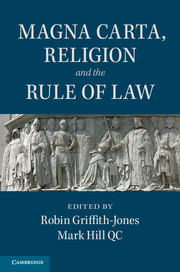Book contents
- Frontmatter
- Contents
- List of contributors
- Preface and acknowledgments
- I Introduction
- II The birth of Magna Carta and the spread of its principles
- III Comparative religious approaches to Magna Carta's rule of law
- IV The contemporary inheritance of Magna Carta
- 15 The development of human rights thought from Magna Carta to the Universal Declaration of Human Rights
- 16 Strasbourg's approach to religion in the pluralist democracies of Europe
- 17 The Great Covenant of Liberties: biblical principles and Magna Carta
- 18 The cardinal rule of religion and the rule of law: a musing on Magna Carta
- 19 Strengthened by the rule of law: the message of Magna Carta for religions today
- Appendix The Charters in translation
- Bibliography
- Index
16 - Strasbourg's approach to religion in the pluralist democracies of Europe
from IV - The contemporary inheritance of Magna Carta
Published online by Cambridge University Press: 05 May 2015
- Frontmatter
- Contents
- List of contributors
- Preface and acknowledgments
- I Introduction
- II The birth of Magna Carta and the spread of its principles
- III Comparative religious approaches to Magna Carta's rule of law
- IV The contemporary inheritance of Magna Carta
- 15 The development of human rights thought from Magna Carta to the Universal Declaration of Human Rights
- 16 Strasbourg's approach to religion in the pluralist democracies of Europe
- 17 The Great Covenant of Liberties: biblical principles and Magna Carta
- 18 The cardinal rule of religion and the rule of law: a musing on Magna Carta
- 19 Strengthened by the rule of law: the message of Magna Carta for religions today
- Appendix The Charters in translation
- Bibliography
- Index
Summary
Introduction: patterns in the Strasbourg case law
An exploration of possible links between Magna Carta and the European Convention on Human Rights (ECHR) reveals that both documents, although separated by centuries, share a common characteristic. With the passage of time, and in varying degrees, these two written covenants have been gradually understood – and to some extent rediscovered – as foundational documents for a ‘constitutional’ structure for the protection of fundamental rights in Britain and Europe respectively. And in both documents, religion plays a role of some significance.
Focusing specifically on the ECHR and the case law of the European Court of Human Rights (ECtHR), it is noteworthy that, when I started working on these issues almost thirty years ago, the European Convention and the Strasbourg jurisprudence attracted relatively little attention from the scholarly community. Indeed, the general legal literature on the Convention and the Court was quite limited (but normally very good); hardly anyone was interested in studying Strasbourg's approach to religion. The main – and almost only – essay on this area was a book written by an Italian scholar as long ago as 1967, namely eight years after the Strasbourg jurisdiction had begun to function.
Things have changed much since then. Not only in Europe, but also in virtually all the world, it is not easy to conceive of a legal or political academic discourse, an academic event or a project of legal reform on human rights that does not contain references to the ECHR or the ECtHR's case law. The judgments of the European Court are frequently cited not only by European national courts but also by courts elsewhere in the world. The media frequently comment on Strasbourg judgments, which would have been unimaginable not so long ago. There are numerous research projects, internet sites and blogs devoted to the Strasbourg jurisprudence. In the area of freedom of religion or belief, the legal literature has experienced a continuous crescendo in just the last two decades, such that it is currently overwhelming.
- Type
- Chapter
- Information
- Magna Carta, Religion and the Rule of Law , pp. 281 - 300Publisher: Cambridge University PressPrint publication year: 2015
- 2
- Cited by



